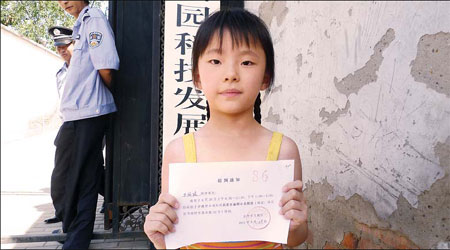Change in rules to help children return to class
 0 Comment(s)
0 Comment(s) Print
Print E-mail
China Daily, August 19, 2011
E-mail
China Daily, August 19, 2011
Public schools are opening their doors to thousands of pupils left stranded by the latest campaign to close unsafe and unlicensed classrooms.
Regulations at five schools in Haidian district have been relaxed to make it easier for the children of migrant workers to be enrolled.
The move will help resettle 3,200 youngsters who were facing the prospect of having no school to go to when the new semester starts this month.
"Getting my daughter into a public school would not have been imaginable had her previous school not been closed," said Li, a migrant worker from Tianjin who declined to give her full name. The New Hope Primary School, where her child has just finished the second grade, was torn down on Aug 10.
Li said she tried to get her child into a public school but was thwarted by her inability to produce the five certificates needed to enroll her and a sponsorship fee of 15,000 yuan (US$2,350).
The public schools taking on the stranded students have ceased requiring parents to produce the five certificates, which are their temporary residency permits, proof of having a Beijing address, proof of employment and hometown hukou (permanent residency), as well as a notice from authorities in their native area saying their child has no one to care for him or her back home.
Many parents could not hide their feelings when they left the temporary office set up outside the New Hope Primary School to accept registrations.
"I am glad it's finally settled," said Wang Zhonglun, a migrant worker from Sichuan province. "I lost out on a lot of opportunities because I didn't receive a good education. I don't want my daughter to suffer the same things."
Authorities in Daxing, Haidian and Chaoyang districts shut down 24 schools just before the start of the new semester after carrying out safety checks.
Education authorities in all three districts on Tuesday pledged at a news conference that no child will be left without a school because of the closings. The Beijing News also quoted Qiao Jian, deputy secretary of the education work committee of the Haidian district Party committee, as saying: "The pupils from these schools will be treated the same as the pupils with Beijing hukou in all respects."
Although parents were excited about the prospect of their children going to public schools with better accommodations and more experienced teachers, some raised concerns about whether the equal treatment will last.
"I'm still unsure whether we'll receive this kind of treatment in the long run," Wang said.
Other parents are angry that they were not told the closed schools would be torn down.
"The principal had all of our cell phone numbers, but we had to be informed by the parents of children living near the school," said Fu Xuefeng, a migrant laborer from Henan province. He said some migrant workers and their children were still in their hometowns and knew nothing about the closings.
However, as the public schools are only promising to accept children from closed schools, education options still remain hard to find for parents with children yet to enter primary school.
Yan Wenyou, from Chongqing, left the registration office in frustration on Thursday after he was told the regulations only applied to children registered at the closed schools.
He complained that New Hope Primary School officials had promised to accept his 7-year-old daughter before the school was razed to the ground. "Now the only option is to go to the public school, but I have to pay a fair amount in fees and must provide the five certificates," Yan said.






